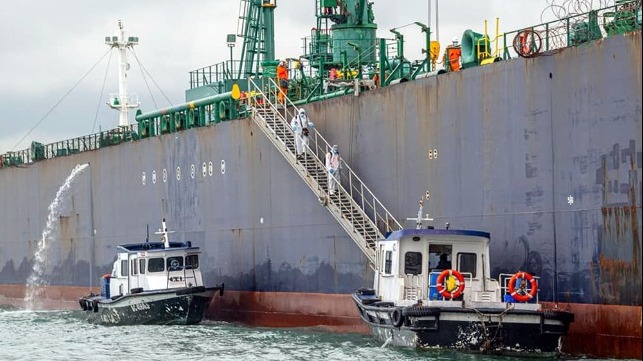UN and Maritime Sector Highlight Urgency of Crew Change and Trade Risk

Using World Maritime Day as the backdrop, United Nations agencies joined with leaders of the maritime industry in hosting a conference to again highlight the urgent need for action to address what they called a humanitarian crisis among seafarers. Convened by the UN Global Compact, the International Maritime Organization, and the International Labour Organization, in collaboration with the International Chamber of Shipping and the International Transport Workers’ Federation, the meeting sought to renew pressure on countries around the world to act.
The overwhelming message from the presenters that ranged from the UN organizations, shippers, union representatives, manufacturers, and maritime countries was that seafarers are at their breaking point. They estimated that there are between 300,000 and 400.000 seafarers trapped at sea long overdue for repatriation and an equal number at home around the world unable to reach their ships uncertain of their wages because they cannot fulfill contracts and pursue their livelihood.
The challenges of being a seafarer were reiterated by Captain Hedi Marzougi, who had been at sea between December 2019 and May 2020, as the pandemic unfolded. He spoke of the physical and mental challenges compounded by the changing regulations and uncertainty of knowing if and when seafarers would be able to get home.
ILO Director-General Guy Ryder summed up everyone’s views saying quite simply, “Seafarers are exhausted and simply cannot continue working on board indefinitely.” Ryder also echoed the fears of many that the global supply chain is on the verge of a breakdown. Noting that a plan of action exists to address the challenges of crew change, Ryder questioned why there has not been movement suggesting three issues, a belief that crew change presents an unacceptable threat to public health; that it is too complicated due to the need for cross-border global coordination; or simply that people and governments don’t think it is that important.
Noting that there are an estimated 60,000 cargo ships that maintain at least 80 percent of global trade trapped at sea, IMO Secretary-General Kitack Lim repeated the often-heard call that seafarers need to be recognized as key workers essential to global trade. UN Secretary-General Antonio Guterre in a prepared statement expressed his concern and support and in a letter addressed to the Secretary-General, 29 of the world’s leading consumer goods manufacturers added their support for urgent action to recognize seafarers and the role they play in maintaining global trade.
The actions of individual flag states and ports were recognized along with the fact that a plan exists for the actions required. Canada highlighted its exemptions from quarantine and visa process for seafarers as well as its efforts to provide shore leave, while Panama, Kenya, and the Philippines represented different areas of the world in building individual efforts. France highlighted its national crisis center, but also summed up the views saying that better collaboration is needed between port and flag states. Both the ICS’s Platten and ILO’s Ryder pointed out the extraordinary steps ship owners and operators have taken, including diverting ships dramatically off their trade routes to reach a port where changes are possible.
Many of the solutions that the meeting highlighted were similar to the previous discussions, including the conference the UK hosted during the summer where countries around the world committed to working together. Stephen Cotton, General Secretary, International Transport Workers’ Federation, illustrated today’s situation by saying. “Statements alone do not move seafarers on and off ships.”

that matters most
Get the latest maritime news delivered to your inbox daily.
Speaking as the representative of the shipping industry, Henriette Hallberg Thygesen, VP and CEO, Fleet and Strategic Brands at A.P. Moller-Maersk, said a pragmatic solution is needed that includes open borders, less bureaucracy, and respect for human rights. She summed up the mood by saying the solution needs to be political and practical.
Hosting the discussion, the UN Global Compact acknowledged the time has come for governments to come together. They concluded by saying that time is running out and that the problem of seafarers and fulfilling the vital role they provide is not going away on its own. They recognized that only a coordinated global response will create the accommodations to provide for seafarers and protect global supply chains.
